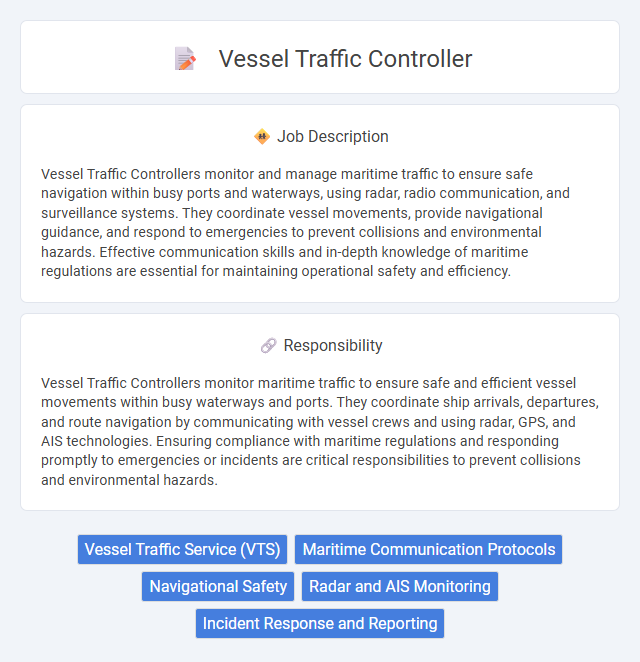
Vessel Traffic Controllers monitor and manage maritime traffic to ensure safe navigation within busy ports and waterways, using radar, radio communication, and surveillance systems. They coordinate vessel movements, provide navigational guidance, and respond to emergencies to prevent collisions and environmental hazards. Effective communication skills and in-depth knowledge of maritime regulations are essential for maintaining operational safety and efficiency.
Vessel Traffic Controller roles likely suit individuals with high stress tolerance and excellent multitasking abilities due to the demanding nature of monitoring maritime traffic. Candidates prone to anxiety or difficulty concentrating under pressure may find the job challenging. People demonstrating strong decision-making skills and situational awareness probably have a higher chance of success in this field.
Qualification
Vessel Traffic Controllers require specialized training in maritime navigation, radar operation, and communication protocols to manage ship movements safely and efficiently. A strong background in maritime regulations, emergency response procedures, and situational awareness is essential for preventing collisions and ensuring smooth vessel operations in busy waterways. Certification from recognized maritime authorities and proficiency in real-time monitoring systems further qualify professionals for this critical role.
Responsibility
Vessel Traffic Controllers monitor maritime traffic to ensure safe and efficient vessel movements within busy waterways and ports. They coordinate ship arrivals, departures, and route navigation by communicating with vessel crews and using radar, GPS, and AIS technologies. Ensuring compliance with maritime regulations and responding promptly to emergencies or incidents are critical responsibilities to prevent collisions and environmental hazards.
Benefit
Vessel Traffic Controllers likely experience significant benefits including enhanced safety for maritime navigation and reduced risk of accidents. They probably enjoy a dynamic work environment that offers real-time problem-solving and decision-making challenges. The role may also provide job stability and competitive compensation due to its critical importance in ensuring efficient vessel movements.
Challenge
Vessel Traffic Controller roles likely present challenges due to the need for continuous monitoring and quick decision-making to ensure maritime safety. The job probably demands high concentration and the ability to manage multiple vessel movements simultaneously, increasing the risk of stress and fatigue. Navigating complex traffic patterns and responding to emergency situations might significantly test an individual's problem-solving skills.
Career Advancement
Vessel Traffic Controllers monitor and manage maritime traffic to ensure safe and efficient navigation in busy waterways, ports, and harbors. With experience, professionals can advance to senior roles such as supervisory positions, training instructors, or maritime safety coordinators, gaining expertise in emergency response and regulatory compliance. Certifications from maritime authorities and continuous training enhance career progression opportunities and increase responsibilities in large-scale vessel traffic management.
Key Terms
Vessel Traffic Service (VTS)
Vessel Traffic Controllers operate within Vessel Traffic Service (VTS) centers to monitor and manage maritime traffic, ensuring safe navigation and preventing collisions in busy waterways. They use radar, automatic identification systems (AIS), and communication tools to provide real-time information and navigational assistance to vessels. Expertise in maritime regulations, situational awareness, and emergency response protocols is critical for maintaining efficient vessel movement and port security.
Maritime Communication Protocols
Vessel Traffic Controllers play a critical role in managing maritime navigation by utilizing specialized maritime communication protocols such as VHF radio, AIS (Automatic Identification System), and DSC (Digital Selective Calling) to ensure safe and efficient vessel movements. They monitor traffic patterns, coordinate ship arrivals and departures, and provide real-time navigational assistance while strictly adhering to IMO (International Maritime Organization) communication standards. Mastery of maritime communication protocols is essential for preventing collisions, mitigating environmental risks, and supporting emergency response operations in busy waterways.
Navigational Safety
Vessel Traffic Controllers play a crucial role in maintaining navigational safety by monitoring and directing ship movements within busy waterways and ports to prevent collisions and grounding. They utilize advanced radar, AIS (Automatic Identification Systems), and communication technology to provide real-time guidance and ensure compliance with maritime traffic regulations. Their expertise in traffic coordination significantly reduces risks, safeguarding both vessels and marine environments from navigational hazards.
Radar and AIS Monitoring
Vessel Traffic Controllers expertly manage ship movements using advanced radar and Automatic Identification System (AIS) monitoring to ensure maritime safety and efficient navigation. Their responsibilities include real-time tracking of vessel positions, identifying potential collision risks, and coordinating traffic to prevent congestion in busy ports or waterways. Proficiency in interpreting radar signals and AIS data is essential for maintaining situational awareness and supporting maritime traffic management operations.
Incident Response and Reporting
Vessel Traffic Controllers play a critical role in incident response by monitoring maritime traffic for potential hazards and coordinating immediate actions to prevent accidents. They utilize radar, communication systems, and real-time data to detect and respond to emergencies, ensuring rapid deployment of rescue or containment measures. Accurate and timely reporting of incidents contributes to safety protocols, regulatory compliance, and continuous improvement in maritime traffic management.
 kuljobs.com
kuljobs.com